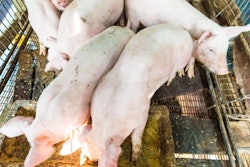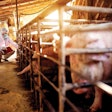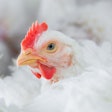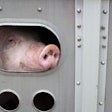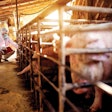
The spread of African swine fever in Asia will reduce South Korea’s meat imports, according to the latest forecast.
There have been more cases of African swine fever (ASF) in wild boar in South Korea and Russia’s Far East, while more details have emerged of the ASF situation in the Philippines. Although no cases have yet been reported in either country, the U.K. and Australia have carried out a joint exercise to practice disease control measures.
South Korea will import 7.5% less meat in 2020 than last year, according to the latest forecast from the Korea Rural Economic Institute (KREI). KREI attributes this reduction to the widespread outbreaks of ASF in Asian countries, reports Yonhap.
The number of wild boar testing positive for the ASF virus has risen to 116, according to another report from the same source. Over the past week, 11 dead or dying infected animals have been found in the border area with North Korea. They were located in the Yeoncheon and Paju regions of Gyeonggi province, and in Gangwon province’s Hwacheon district. In all these areas, previous cases of ASF in wild boar have been detected.
There have been no new cases of the disease in domestic pigs since October 2019, reports Yonhap. Culling of almost 400,000 domestic pigs appear to have prevented the spread of ASF in commercial and backyard herds.
ASF situation in the Philippines
Since ASF was first officially confirmed in the Philippines in September 2019, few details have emerged of the progress of the disease.
This situation changed over the past week as the country’s agriculture ministry transmitted four reports with further information to the World Organisation for Animal Health (OIE).
According to these notifications, there were 130 confirmed ASF outbreaks in backyard and commercial pig farms between August 19 and December 27. These led to the culling of almost 138,800 animals in affected herds.
Based on the official reports to the OIE, there were 170 confirmed ASF outbreaks in the Philippines between July 25 and the end of 2019. Direct losses amounted to more than 187,000 pigs in 10 provinces/regions on the island of Luzon.
Commenting on the situation, the director of the Bureau of Animal Industry said the disease is being contained.
Surveillance is continuing, said Ronnie Domingo, and only a small percentage of the pigs being culled are now testing positive for the ASF virus. The disease is continuing but it is tapering off, reports Philstar.
Recently, the failure to reach a key government economic target in 2019 was partly attributed to the ASF outbreaks.
More cases in wild boar in Russia’s Far East
Five more wild boar in the Far East federal district have tested positive for the ASF virus. According to the latest report from the Russian agriculture ministry to the OIE, the animals were found at three locations in Primorsky krai around the New Year.
International cooperation for ASF control
This week, the United Kingdom and Australia have been working together on an exercise aimed at strengthening their strategies to control ASF, according to the U.K. government. Due to trade links with — and the proximity to — affected regions in Asia and Europe, both countries see the disease as posing a major risk to their respective pig industries.
Over three days, a joint, simulated exercise was carried out to practice biosecurity measures in the event of ASF. The main focus was on how to apply movement restrictions to best manage a possible future outbreak.
Participants in the exercise were the U.K.’s Department for the Environment, Food and Rural Affairs (Defra), and the Department of Primary Industries for the Australian state of New South Wales.
ASF in Asia has led to a 5.5% reduction in the continent’s compound feed production. Furthermore, it contributed to a drop of more than 1% in total global feed output, according to experts speaking at a recent event in the U.S.
View our continuing coverage of the global African swine fever situation.


